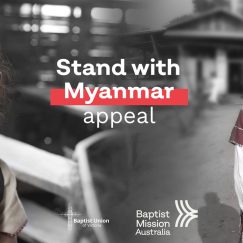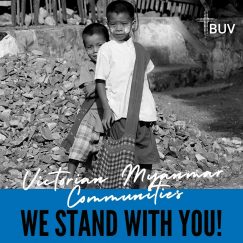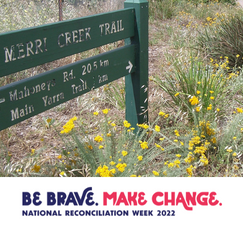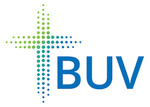29th June 2023
Kyneton Baptist provides open arms for Refugees
Imagine landing in an unfamiliar country with precious little knowledge of local language, health care, housing, education and food sources, all while battling the effects of trauma.
This is the challenge most refugees face upon first coming to Australia as they flee from harrowing difficulties in their homeland.
A group from Kyneton Baptist Church (KBC) have joined with others from the Macedon ranges to bridge the gap for refugees by participating in a programme known as the Community Refugee Integration and Settlement Pilot (CRISP), with the aim of providing the refugees with a small network to make them feel welcome, connect them with services and form relationships to help them begin to rebuild their lives in Australia. Support group members Ryan and Suzie Smith, from KBC, said CRISP provided a big advantage for refugees by having many building blocks in place for settling into Australian society even before they arrive.
“We essentially sponsor or support the family when they come in, and that includes everything from picking them up at the airport, to filling in any gaps that may be there financially for them when they come, to finding housing, and setting up medical [contacts],” Ryan said.
The program, which started mid last year is organised by Community Refugee Sponsorship Australia (CRSA) in partnership with the Federal Government and aims to support 1500 refugees over four years via help from community groups, such as the Kyneton one.
Basically, a support group of five to ten adult volunteers undergoes approval and training with CRSA and is then custom matched with refugees identified as in urgent need of resettlement by the United Nations High Commissioner for Refugees.
Last month the Kyneton CRISP group, known as the Ranges Resettlement Group, welcomed a family from Guatemala. Several members of the group speak Spanish, which helped them to easily communicate with the newcomers. “The program is essentially a 12-month commitment to the family to integrate them in the community,” Ryan said. “It’s a lovely program. If I was a refugee, I’d much prefer a group of people who are welcoming me in who are invested in me rather than an assigned caseworker. They’ve got a small community around them right from the beginning. It’s a great opportunity for churches to be involved and churches are well placed for that.”
He said many people of faith are skilled in hospitality and have a willingness to welcome people, which may draw them to the program.
Suzie said they valued the four-month-long training and ongoing support within CRISP.
“We explored trauma, the relational aspects of what’s going to be needed to assist people to integrate, that long-term commitment and how that will benefit them. We learned that it’s important to be aware of your motives of why you’re getting involved. We also explored the potential perceptions of other people in the community – we are motivated as a group, but that doesn’t mean everyone in your community will be motivated. Our group has experienced extensive willingness and generosity from businesses and the wider community and the churches in our surrounding area.”
Ryan and Suzie cautioned that participants should not “expect a lot back” from the refugees assisted by their group because these families have often been traumatised and are under enormous amounts of stress.
“You don’t just do it to feel good about yourself,” Ryan said. “It’s hospitality in its fullness. That’s the reason so many people of faith are involved in this, they want to love people on the margins out of a response to God’s love for us. That’s largely the motivation.”
Suzie said CRISP was also a wonderful joint platform for working alongside team members who don’t know God’s love but who also want to show love and hospitality to others.
“You can feel quite helpless with the refugee narrative in the media, and this is a way that people can feel like they’re contributing to the community. It is really nice that we can serve alongside people outside the church. The structures are not church ones, they’re given to us.
“It’s great to have a group. It’s pretty time intensive at times – they recommend setting aside an hour a week but it’s much more at the start when you’re setting people up. With a group you have different skills and strengths, and different lifestyles we as hosts can introduce them to.”
Along the way, the group members have the privilege of many lovely experiences. Last weekend, Suzie took the Guatemalan refugees into the city to teach them how to use public transport and show them some major sights. They celebrated a birthday last week by joining with another Guatemalan refugee family, which is supported by a second KBC CRISP group.
“They are making steps in a society that’s unfamiliar,” Suzie said.
“One family were really nervous about driving at night time because you don’t drive at night in Guatemala,” Ryan said. “They were worried about getting carjacked and various things, and they had to be comforted. It’s about working through these stresses and fears – just the normal stuff that any family might experience under stress, but it’s heightened because they’re in a new country. They’re totally disoriented and are managing years of trauma.”
CRSA recommends raising between $5000-$10,000 per group to provide accommodation, setup and living costs on arrival. The Kyneton group raised $10,000 through a local art auction and the generous donations of the community.
The CRISP is inspired by a similar program operating in Canada since the 1970s. Countries such as the UK, USA, New Zealand and Ireland are also adopting this approach.
Visas for refugees in the CRISP program are drawn from Australia’s annual humanitarian intake of 13,750 places per year but the Federal Government is considering making these community sponsored programs additional to, rather than within, this quota.
For more information about CRISP visit https://refugeesponsorship.org.au/what-we-do/crisp/










